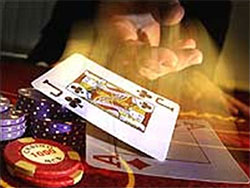
Parkinson's Drugs May Spur Compulsive Behaviors. Study estimated a 10 percent increased risk of impulsive gambling, shopping and hypersexuality.


New research determines problem gambling and obsessive-compulsive behaviors are a product of similar genetic as well as behavioral links.
Although physiological and behavioral similarities between problem gambling and substance abuse have long been noted, gambling’s ties to obsessive-compulsive disorder has only recently been identified.
Researchers at Yale University, Veterans Affairs Medical Center, and the Saint Louis University School of Medicine believe the new findings may help guide not only treatment development efforts but also identify biological measures underlying the conditions.
The linkage between problem gambling and obsessive-compulsive behaviors is discussed in a new study of twins, published in JAMA Psychiatry.
The study finds that individuals with severe obsessive-compulsive behaviors — or those who demonstrate specific forms of the behavior, such as fear of germs or desire for order in the environment — are also more likely to meet diagnostic criteria for gambling disorder.
“This overlap between problem gambling and obsessive-compulsive behaviors appears to be genetic in nature,” said Dr. Marc Potenza, professor of psychiatry, child study, and neurobiology, and senior author of the study.
“This common biological basis of the disorders could help inform treatment development efforts for individuals with co-occurring gambling problems and obsessive-compulsive behaviors.”
Potenza, founder and director of the Problem Gambling Clinic at Yale, said the field of psychiatry has struggled with how best to classify gambling disorders.
In the older diagnostic guidelines for doctors, pathological gambling was classified as an impulse control disorder, but in current guidelines, gambling disorder is classified as an addiction.
“I think the current evidence in conjunction with previously published data suggests that gambling disorder shares similarities with both addictions and obsessive-compulsive behaviors,” Potenza said.
Is Compulsive Gambling A Disease
Source: Yale University